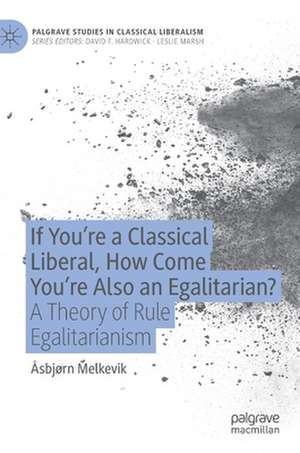If You’re a Classical Liberal, How Come You’re Also an Egalitarian?: A Theory of Rule Egalitarianism: Palgrave Studies in Classical Liberalism
Autor Åsbjørn Melkeviken Limba Engleză Hardback – 29 mar 2020
| Toate formatele și edițiile | Preț | Express |
|---|---|---|
| Paperback (1) | 640.88 lei 6-8 săpt. | |
| Springer International Publishing – 29 mar 2021 | 640.88 lei 6-8 săpt. | |
| Hardback (1) | 644.82 lei 6-8 săpt. | |
| Springer International Publishing – 29 mar 2020 | 644.82 lei 6-8 săpt. |
Din seria Palgrave Studies in Classical Liberalism
- 20%
 Preț: 567.82 lei
Preț: 567.82 lei -
 Preț: 319.90 lei
Preț: 319.90 lei - 20%
 Preț: 689.04 lei
Preț: 689.04 lei - 17%
 Preț: 360.48 lei
Preț: 360.48 lei -
 Preț: 252.24 lei
Preț: 252.24 lei - 18%
 Preț: 729.36 lei
Preț: 729.36 lei - 15%
 Preț: 695.34 lei
Preț: 695.34 lei - 15%
 Preț: 582.80 lei
Preț: 582.80 lei - 15%
 Preț: 696.50 lei
Preț: 696.50 lei - 15%
 Preț: 640.24 lei
Preț: 640.24 lei -
 Preț: 450.71 lei
Preț: 450.71 lei - 15%
 Preț: 698.30 lei
Preț: 698.30 lei - 15%
 Preț: 640.88 lei
Preț: 640.88 lei - 15%
 Preț: 703.52 lei
Preț: 703.52 lei - 15%
 Preț: 695.48 lei
Preț: 695.48 lei - 15%
 Preț: 700.61 lei
Preț: 700.61 lei - 18%
 Preț: 723.24 lei
Preț: 723.24 lei - 18%
 Preț: 894.97 lei
Preț: 894.97 lei - 15%
 Preț: 527.32 lei
Preț: 527.32 lei - 15%
 Preț: 640.24 lei
Preț: 640.24 lei - 15%
 Preț: 468.25 lei
Preț: 468.25 lei - 15%
 Preț: 638.76 lei
Preț: 638.76 lei - 15%
 Preț: 697.32 lei
Preț: 697.32 lei - 15%
 Preț: 696.02 lei
Preț: 696.02 lei - 15%
 Preț: 700.61 lei
Preț: 700.61 lei -
 Preț: 386.00 lei
Preț: 386.00 lei - 15%
 Preț: 643.65 lei
Preț: 643.65 lei -
 Preț: 487.96 lei
Preț: 487.96 lei - 15%
 Preț: 478.57 lei
Preț: 478.57 lei - 15%
 Preț: 692.24 lei
Preț: 692.24 lei - 18%
 Preț: 896.84 lei
Preț: 896.84 lei - 18%
 Preț: 1001.19 lei
Preț: 1001.19 lei -
 Preț: 394.12 lei
Preț: 394.12 lei
Preț: 644.82 lei
Preț vechi: 758.60 lei
-15% Nou
Puncte Express: 967
Preț estimativ în valută:
123.40€ • 128.36$ • 101.88£
123.40€ • 128.36$ • 101.88£
Carte tipărită la comandă
Livrare economică 14-28 aprilie
Preluare comenzi: 021 569.72.76
Specificații
ISBN-13: 9783030379070
ISBN-10: 3030379078
Pagini: 247
Ilustrații: XIX, 306 p. 1 illus.
Dimensiuni: 148 x 210 mm
Greutate: 0.54 kg
Ediția:1st ed. 2020
Editura: Springer International Publishing
Colecția Palgrave Macmillan
Seria Palgrave Studies in Classical Liberalism
Locul publicării:Cham, Switzerland
ISBN-10: 3030379078
Pagini: 247
Ilustrații: XIX, 306 p. 1 illus.
Dimensiuni: 148 x 210 mm
Greutate: 0.54 kg
Ediția:1st ed. 2020
Editura: Springer International Publishing
Colecția Palgrave Macmillan
Seria Palgrave Studies in Classical Liberalism
Locul publicării:Cham, Switzerland
Cuprins
Chapter 1. Four Concepts of Rules: A Theory of Rule Egalitarianism.- Chapter 2. Can I Have Four Strikes? On Pareto Superiority and Social Justice.- Chapter 3. No Malibu Surfer Left Behind: Three Tales About Coercion.- Chapter 4. The Fictitious Liberal Divide: Economic Rights Are Not Basic.- Chapter 5. No Progressive Taxation Without Discrimination?.- Chapter 6. A Tax Dead on Arrival: Inheritance and Social Mobility.- Chapter 7. Toward a Model of Default Fairness: On Bargaining Power.- Chapter 8. Starve All the Lawyers: Four Theories of the Just Price.- Chapter 9. The Rule Egalitarian Project.
Notă biografică
Åsbjørn Melkevik is a Banting Postdoctoral Fellow at the Center of Research in Ethics at the University of Montreal. He has been a Postdoctoral Fellow at the Edmond J. Safra Center for Ethics at Harvard University and an exchange fellow at Tel Aviv University. He received his Ph.D. in political studies from Queen’s University and specializes in political theory and business ethics.
Textul de pe ultima copertă
Classical liberalism has wrongly been regarded as an ideology that rejects the welfare state. In this book, Åsbjørn Melkevik corrects this common reading of the classical liberal tradition by introducing a theory of “rule egalitarianism”. Not only is classical liberalism compatible with social justice, but it can also help us understand why some egalitarian endeavours are an essential feature of a market society. If a necessary link exists between the classical liberal tradition and the moral and institutional dimensions of the rule of law, then this tradition is bound to uphold a substantial form of social justice. Coherence requires that classical liberals like Friedrich Hayek and Milton Friedman adopt an authentic egalitarian program. They should ameliorate poverty and limit inequality not merely out of prudence or collective self-interest, but for the natural justice of ongoing social cooperation as well as for the impartiality of market institutions.
Caracteristici
Reconciles the classical liberal tradition with social justice Provides a radical restatement of classical liberalism after Friedrich Hayek Shows how a commitment to the rule of law leads to egalitarianism
